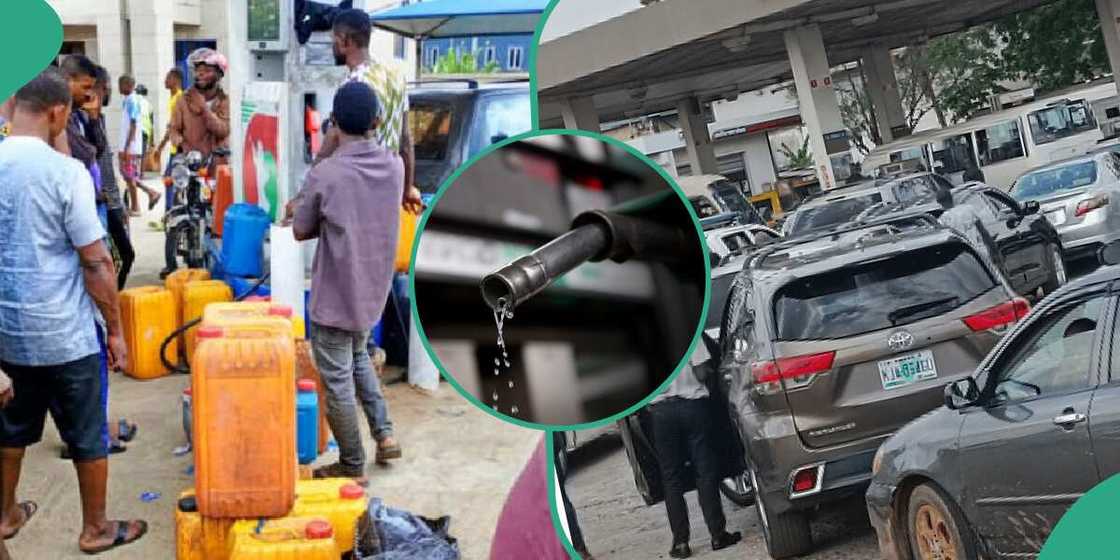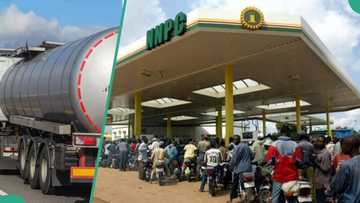Fuel Scarcity Looms as Marketers Stall Importation Over Forex Shortage
- If the current situation is not arrested, Nigeria may once again face the trouble of petrol scarcity
- This is because petrol importers are lamenting the inability to access the forex needed to purchase the product
- As a result of the scarcity of forex, importers cannot place orders for new products, a source told Legit.ng
Unlock the best of Legit.ng on Pinterest! Subscribe now and get your daily inspiration!
Some oil marketers in Nigeria lament that the inability to access foreign exchange may affect their scheduled importation of petrol. The interruption in the planned schedule, they say, may affect the delivery of the product to Nigerians.
This was disclosed to Legit.ng by a source within the Independent Petroleum Marketers Association of Nigeria (IPMAN), who spoke anonymously.
It would be recalled that a week ago, Legit.ng reported that the petrol price might shoot up to around N720/litre due to the increase in global crude oil prices and naira depreciation.

Read also
“No more N900/$”: BDC operators send important message to CBN as Naira records massive gain against US dollar

Source: UGC
It only took the intervention of the Nigerian National Petroleum Company Limited (NNPCL) through a press statement to calm the tension, as it stated in clear terms that there was no plan to hike the price of petrol.
PAY ATTENTION: Сheck out news that is picked exactly for YOU ➡️ find the “Recommended for you” block on the home page and enjoy!
The Federal Government, through President Bola Tinubu's Special Adviser on Media and Publicity, Ajuri Ngelale, also addressed State House correspondents, assuring Nigerians that there was no plan to increase the petrol price.
Marketers halt importation over forex
The source told Legit.ng that importers could not order new products due to the rising exchange rate and even the scarcity of forex.
He said:
Acquiring foreign exchange for purchases through the import and export (I&E) window has proven challenging. Our reliance has shifted towards the existing inventory within the Nigerian National Petroleum Company Limited (NNPCL) depot. Hence, in the absence of accessible foreign exchange, the feasibility of carrying out imports becomes constrained.

Read also
“Learn from Kenya”: Oil marketers fear petrol price may surge above N617 with exchange rate instability
The source also revealed that the I&E Window, known for presenting a more favourable forex rate ranging from approximately N740 to N760 per dollar compared to the open market's N950 per dollar, is currently experiencing a lack of liquidity.
Consequently, it has been incapable of furnishing the essential amount of money needed by dealers for the import of PMS. This situation has prompted dealers prepared to import the product to halt their petrol importation plans.
Increase in ex-depot price of petrol
Another issue signalling trouble for Nigerians is the unavoidable increase in the ex-depot price of petrol which has shifted from N555/litre to N600/litre at some private depots.
The abrupt shift in circumstances has resulted in a surge of panic buying of petrol, causing queues to form at some filling stations.
In the last few days, numerous petrol retail establishments refrained from serving motorists, whereas those that remained open experienced extensive lines of waiting vehicles.
Nevertheless, there has been no adjustment in the commodity's pump price, which remained consistent until yesterday.
Presidency explains why petrol prices will not go down with more refineries
In related news, Legit.ng reported that the cost of petrol at fuel stations would remain unaffected even if all five Nigerian refineries operate at maximum capacity, yielding the highest volume of the product.
This viewpoint was conveyed by Ajuri Ngelale, the Special Adviser on Media and Publicity to President Bola Tinubu, during his appearance on the "Your View" talk show on Television Continental.
In the course of the television discussion, which Legit.ng monitored, Ngelale refuted the notion that an increase in the number of refineries would lead to a decrease in petrol prices, dismissing it as a worldwide fallacy.
Source: Legit.ng



